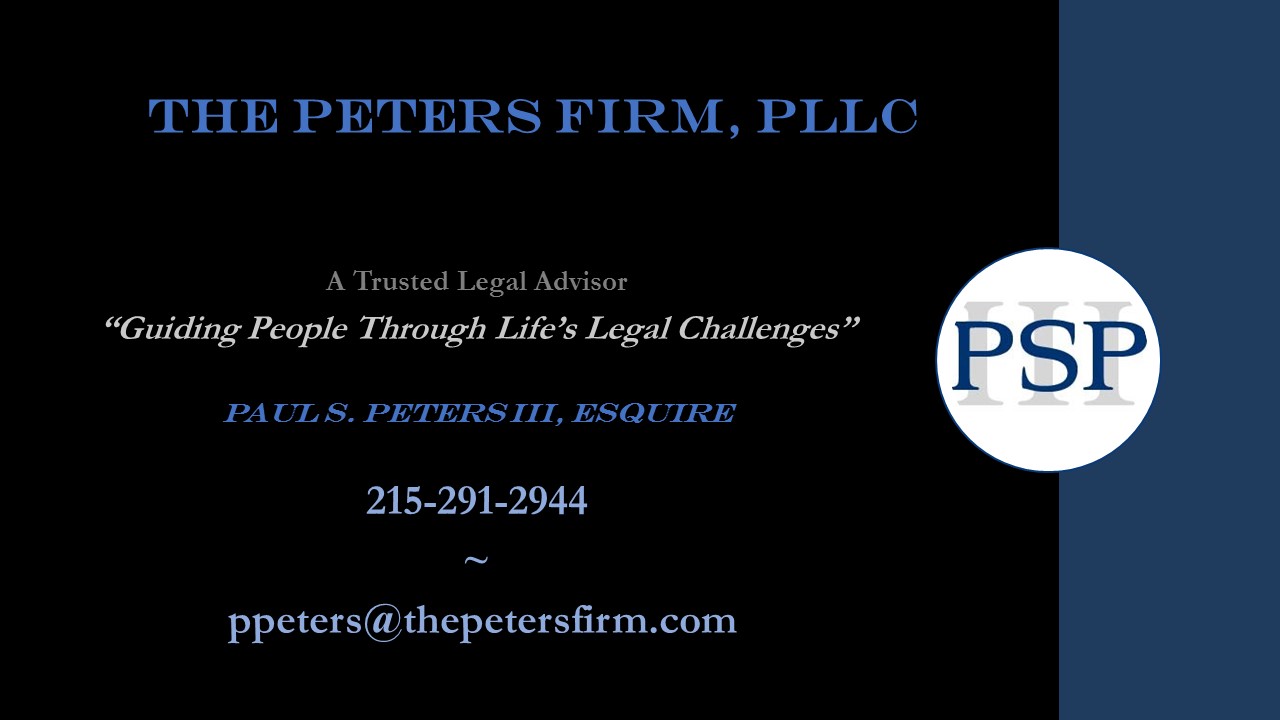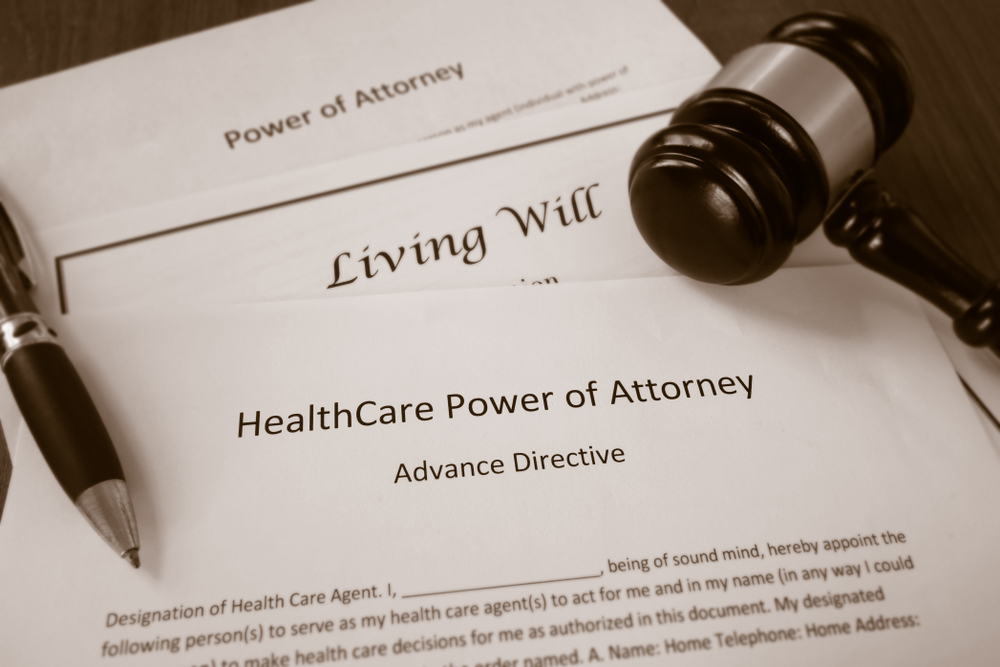Healthcare Directive/Living Will and Power of Attorney
What is a Power of Attorney and Healthcare Directive or Living Will?
Both documents have nothing to do with one’s death; both become void at the time of one’s death. These documents dictate who has decision making power for your affairs and medical care when you can no longer make decisions for yourself.
Examples, where a Power of Attorney or a Health Care Directive may come into play, are: if you are in a coma or other form of unconsciousness, suffering from dementia or Alzheimer’s disease, or in a level of pain/discomfort rendering you unable to make sound, informed, and educated decisions regarding finances, assets, or medical care.
POWER OF ATTORNEY
A Power of Attorney is the granting to another person the right to act on your behalf in managing your financial affairs. The person granting the power is known as the Principal and the person accepting the power is known as the Agent.
A Power of Attorney typically pertains to making financial decisions for you when you are unable to do so. A Power of Attorney may take effect when you are not conscious or of sound mind, but it may also take effect if you are confined to bed, home, or a medical facility, but otherwise mentally competent. You may become ill or disabled to the extent that you are mentally or physically unable to manage your personal financial affairs yourself. In this case, a Power of Attorney would take effect.
Your Power of Attorney may be general in the powers granted, or specific and not grant certain powers. You must create and sign a Power of Attorney while you are of sound mind and conscious. You cannot wait until you begin to have memory and/or mental difficulties as at that point you are not deemed capable of understanding and legally signing a Power of Attorney or any legal document.
The Power of Attorney allows your agent to manage your banking, pay bills, negotiate checks, file lawsuits, purchase goods and services, purchase, sell and manage your real estate, investments, and other personal property. Your Agent must manage your personal financial affairs for the sole benefit of you, not for the Agent’s own personal benefit. Because this person will have access to all your finances and other assets, it is crucial you think very carefully about who you name as your Agent. Your Agent does not have to be a relative, just someone you trust. Consider if naming an heir under your Will is the best plan as you do not want that person to make decisions to preserve their inheritance.
Putting thought into whom you name as your Power of Attorney is especially important in Pennsylvania. Pennsylvania’s Estate Planning and Elder Laws are lacking when it comes to protecting you from abuse by your Agent. If an Agent abuses their power, it is extremely difficult and costly to have them removed and challenge their actions.
You may revoke or change a Power of Attorney at any time, provided you have the mental capacity to do so. If ever revoked, you should notify your doctor, bank, financial advisors, and family immediately.
If you do not name a Power of Attorney while of sound mind, if you become unable to manage your own finances and assets, anyone in your life can file a petition in court to become your Power of Attorney. This person may not always be who you would wish to have to manage your finances and assets.
To name a Power of Attorney is a relatively simple process that doesn’t take much time, nor does it cost much to do so with a trusted attorney.
HEALTHCARE DIRECTIVE/LIVING WILL
An Advanced Health Care Directive also known as a Living Will is similar to a Power of Attorney in that it takes effect when you can no longer make decisions for yourself. For purposes of an Advanced Health Care Directive, a medical professional will determine when you are no longer capable of making decisions, at which time the Advanced Health Care Directive becomes controlling.
Where the Power of Attorney is mainly focused on financial decisions and personal and real property, the Advanced Health Care Directive is solely focused on your medical care and medical decisions. If you cannot consciously or competently understand, process, and make major medical decisions, the Advanced Health Care Directive directs your medical professionals and family on what is and is not to be done.
The Advanced Health Care Directive has two parts:
(1) Durable Health Care Power of Attorney
(2) Living Will.
Durable Health Care Power of Attorney
This section of the Advanced Health Care Directive appoints someone to ensure your medical wishes are carried out, make medical decisions your Advanced Health Care Directive may have failed to address, and work with health care professionals as your advocate. Just as with the Power of Attorney, whom you choose to play this role should be well thought out and given to someone you trust and know will honor your wishes and act in your best medical interests.
Living Will
The Living Will portion deals directly with the actual medical decisions to be made. A Living Will assists doctors and caregivers in making medical decisions if you are terminally ill, seriously injured, in a coma, in the late stages of dementia, have Alzheimer’s, or near the end of life. This is the portion of the Advanced Health Care Directive that pertains to the unemotionally blunt concept of “pulling the plug.” Absent any explicit directive, medical professionals will often do whatever is necessary to keep one alive if an option is available.
The medical decisions often addressed in a Living Will are:
(1) Mechanical Respiration/Ventilation
(2) Cardiac Resuscitation
(3) Blood Transfusion
(4) Tube Feeding
(5) Invasive Surgery and Medical Tests
(6) Kidney Dialysis
(7) Organ Transplant
(8) Antibiotics
(9) Pain Management
(10) Organ/Body/Tissue Donation.
The Living Will can state you accept or refuse some or all the above actions. It can also state you accept some or all for a certain period of time, but after that time has expired you refuse them. For example, you may dictate that Mechanical Respiration can be used for 60 days to see if there is a chance for recovery, but if there is no change in circumstances after the 60 days, you are to be removed from any Mechanical Respiration.
Just as I explained in the post about Wills, the Living Will portion can be as general or specific as you desire. You can donate none of your organs upon your death, you can donate your entire body to science, or only donate your heart and liver, or donate everything but your eyes. Another example is you can refuse any and all actions to prolong or revive your life, but only allow what is necessary for pain management until you finally pass. These are all very personal medical decisions that you should discuss with your family doctor and close family members.
I believe the Advanced Medical Directive is the most important Estate Planning Tool, equal to Guardianship Directives if you have a child, due to the gravity of the subject and situation. I have no idea what being in a coma or vegetative state is like in terms of what I may understand and feel; I also have no idea what it is like to live with dementia or Alzheimer’s Disease. Therefore, it is crucial to put your position and directives in writing before you no longer can. Just like the Power of Attorney, the moment you are in a coma/vegetative state or suffering from dementia or Alzheimer’s it is too late to dictate your medical desires.
Another consideration is that having these directives in place means your loved ones don’t have to make heartbreaking and highly emotional decisions. A son or daughter may know it is best for their father to be removed from a ventilator to pass peacefully, but having to make that decision for their father is a completely different scenario. Having your wishes legally in writing ahead of time, allows them to follow your direction, and not make the actual decision themselves. This can give loved ones a great deal of peace of mind. You also do not want to create a situation of a battle between loved ones and expensive court proceedings over what decision to be made.
If you do not have an Advanced Medical Directive, the choices about your medical care during a traumatic situation, or end of life, will be solely in the hands of the doctors caring for you. Putting together an Advanced Medical Directive can also be simple and affordable with a trusted attorney.
While a Power of Attorney and Advanced Health Care Directive is difficult and morbid topics to think about and act upon, they are crucial for your well-being, carrying out your wishes, and making the situation that necessitates them easier for your loved ones.




